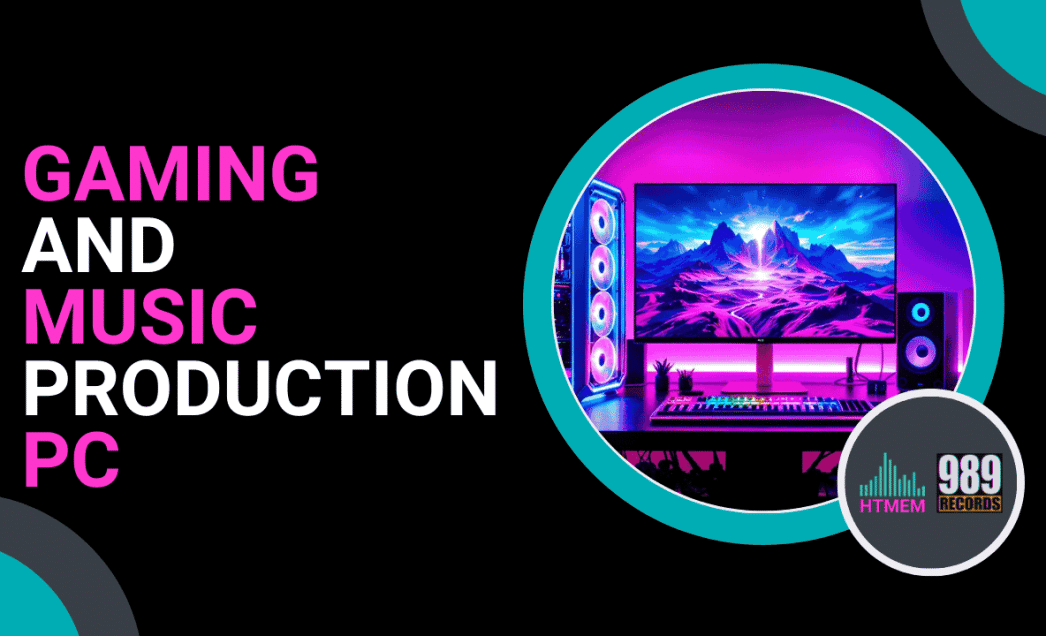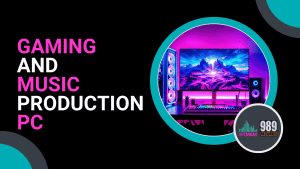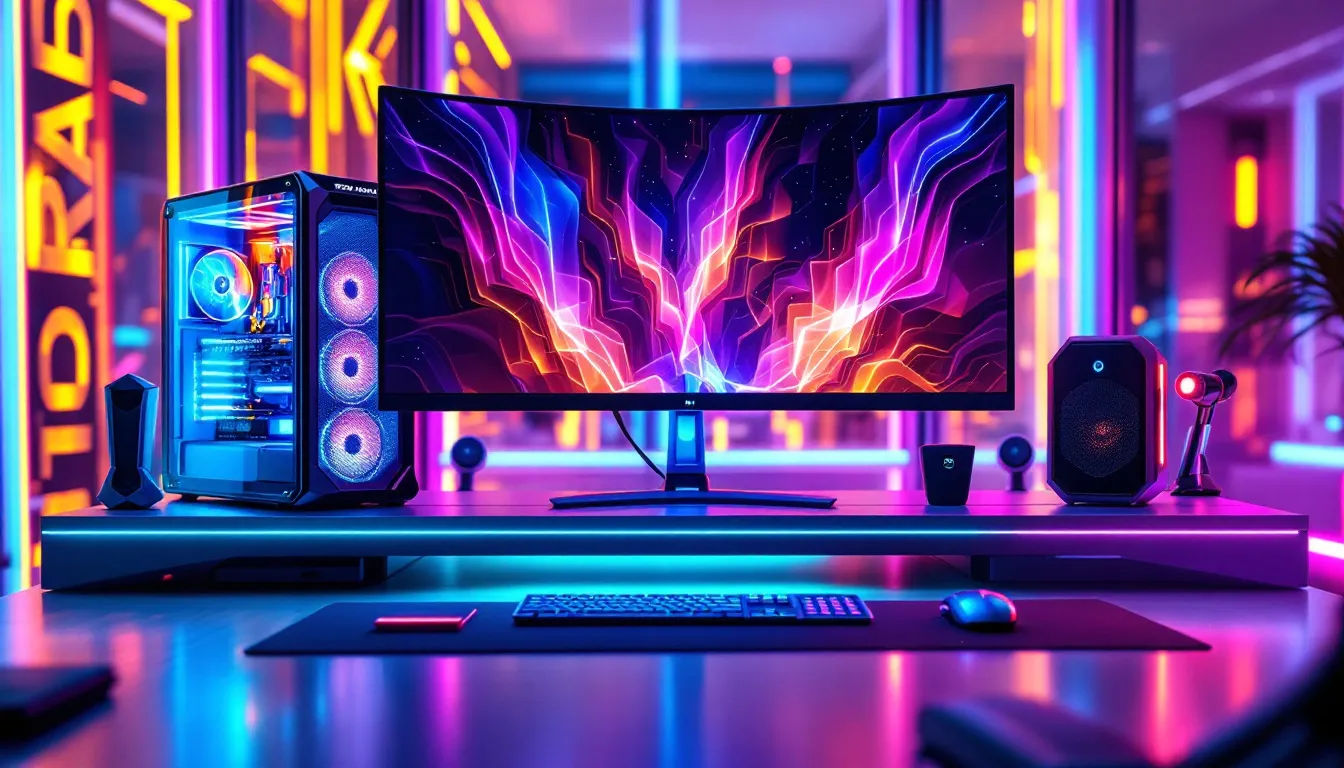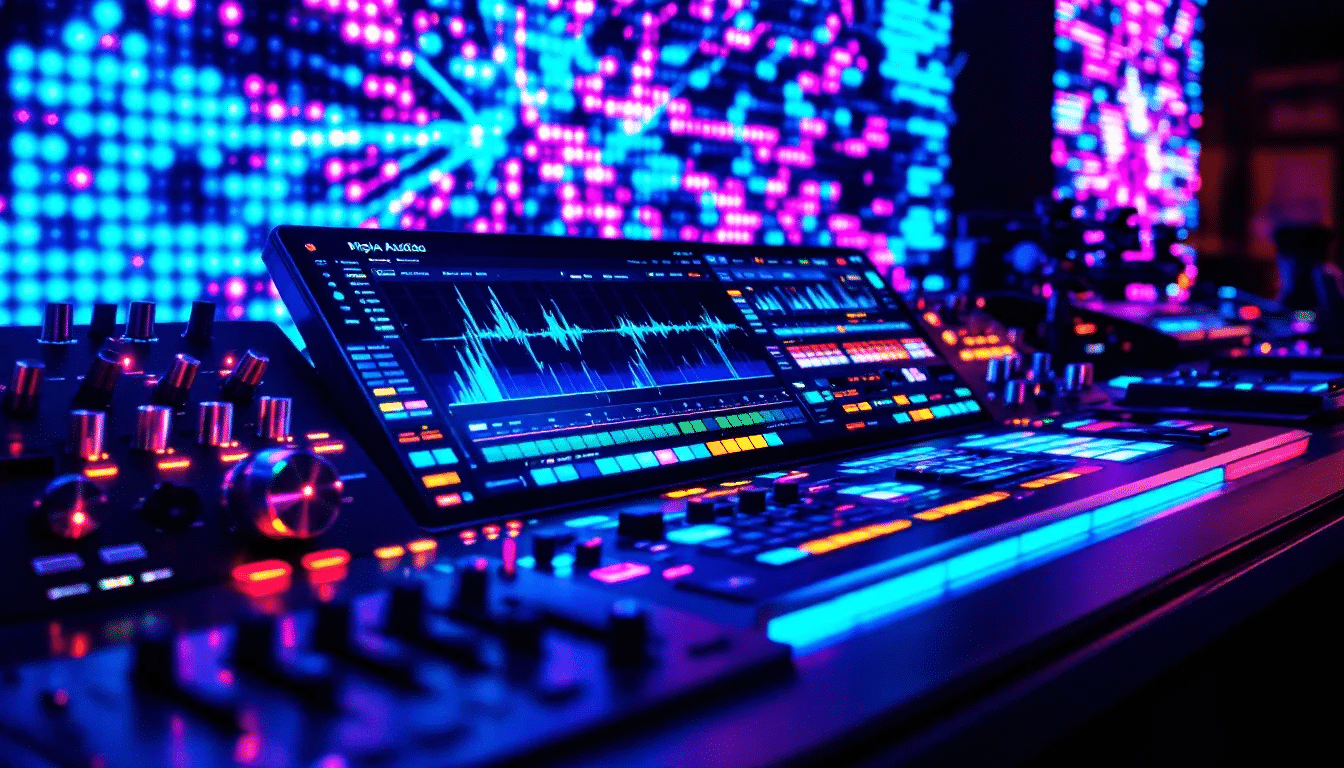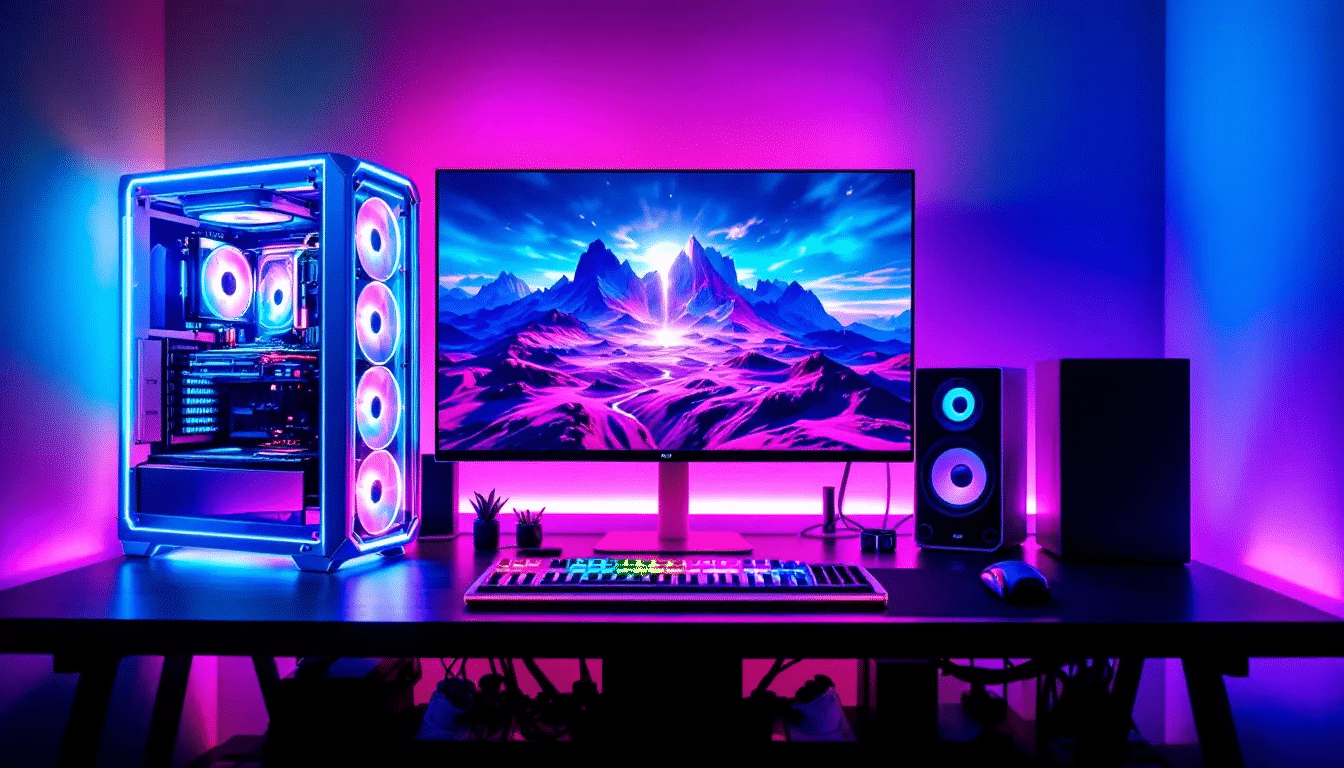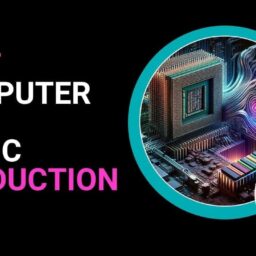Need a PC that handles both high-end gaming and music production?
Discover the best gaming computers and Music Production PC options that satisfy performance, expandability, and effective multitasking.
Key Takeaways
- High-performance components like multi-core processors and ample RAM are essential for seamless gaming and music production. Gaming computers often come with large amounts of RAM, typically ranging from 16GB to 64GB or more, which is crucial for handling complex music production tasks.
- Graphics cards provide benefits beyond gaming, enhancing video rendering for music projects and supporting multiple peripherals for audio production.
- Gaming PCs offer expandability and upgrades, allowing producers to adapt their systems to evolving software demands over time.
What Makes a Great Gaming and Music Production PC
A great gaming and music production PC is a powerhouse of high-performance components, meticulously chosen to handle the demanding tasks of both gaming and music production.
Here are the key features that make such a PC stand out:
First and foremost, a fast CPU with multi-core performance is essential. Processors like Intel’s Core (i9) or AMD’s Ryzen (9 series) are perfect for handling intensive tasks such as audio processing and video editing. These CPUs ensure that your digital audio workstation (DAW) runs smoothly, even when managing multiple tracks and virtual instruments.
Random access memory (RAM) is another critical component. A minimum of 16GB is recommended, but for more complex projects, 32GB or even 64GB can significantly enhance system performance. Ample RAM allows you to handle large sample libraries and run numerous plugins without experiencing lag, ensuring a seamless workflow.
A high-performance graphics card, such as NVIDIA’s GeForce or AMD’s Radeon series, is not just for gaming. These GPUs are invaluable for video editing and rendering, providing the graphical horsepower needed for smooth playback and quick rendering times.
Fast storage solutions like solid-state drives (SSDs) are game-changers in both gaming and music production. SSDs drastically reduce loading times, allowing you to quickly load and save files and ensuring fast system performance. In a few words, this means less waiting and more creating!
For audio quality, a dedicated sound card or audio interface is crucial. These components provide high-quality audio output and input, essential for detailed monitoring and recording during music production.
Lastly, a reliable and efficient cooling system, such as a liquid cooling setup, is vital to keep your system running smoothly. High-performance components generate a lot of heat, and effective cooling prevents overheating, ensuring your PC remains stable during long sessions.
High Performance Components for Music Production and Gaming
The heart of any high-performance gaming or music production PC lies in its components.
Gaming computers are equipped with powerful CPUs, ample RAM, and high-quality sound cards, making them suitable for handling music production software efficiently, despite being primarily designed for gaming. These powerful elements not only define the capabilities of your machine but also ensure it meets the rigorous demands of both gaming and music production.
A multi-core processor is crucial. Why? Because it allows multiple tasks to be processed concurrently, which is essential whether you’re running a game or a digital audio workstation (DAW). Imagine playing your favorite game while Cubase, Ableton Live, or Pro Tools runs seamlessly in the background—an experience made possible by multi-core performance. High-end CPUs such as Intel’s Core or AMD’s Ryzen series are particularly well-suited for this, offering the multi-core performance necessary for running DAWs smoothly. Music production software can be demanding and require significant processing power.
RAM, or random access memory, is another cornerstone of a high-performance setup. Ample RAM is crucial for handling large audio files and multiple applications during music production, improving overall efficiency. This means loading large sample libraries and running numerous plugins without experiencing lag, making your music production setup more fluid and responsive.
Fast storage solutions like solid state drives (SSDs) are game-changers. They significantly reduce loading times for both games and audio projects, contributing to a smoother user experience. Gaming PCs typically come equipped with NVMe SSDs that offer significantly faster read and write speeds compared to traditional HDDs, further enhancing loading times for projects and samples. SSDs allow you to get into your creative zone faster without the frustrating wait times associated with traditional hard drives.
Lastly, investing in a motherboard that supports additional RAM and storage drives is crucial for future-proofing your music production setup. This ensures that as your needs grow, your PC can easily adapt by upgrading components like RAM and storage, ensuring your system stays relevant and powerful for years to come.
In this case, I can suggest you also check the chipset, as motherboards provided with good chipsets are the more stable and reliable.
Music Production Essentials
Creating high-quality music requires a combination of specialized hardware and software components. Here are the essential elements you need for a professional music production setup:
A digital audio workstation (DAW) is the heart of any music production setup. Software like Cubase, Ableton Live, FL Studio, or Logic Pro allows you to record, edit, and produce music with a wide range of tools and features. These DAWs are designed to handle everything from simple recordings to complex multi-track projects.
A MIDI keyboard or controller is indispensable for creating and controlling virtual instruments and effects. These devices allow you to play and manipulate sounds in real-time, adding a tactile element to your music production process.
High-quality monitor speakers are crucial for accurately hearing and mixing your music. Unlike regular speakers, monitor speakers provide a flat frequency response, ensuring you hear your music as it truly is, without any coloration.
A good pair of headphones is equally important, especially for detailed listening and mixing in a quiet environment. Look for headphones that offer a flat response and comfortable fit for long sessions.
A microphone is essential for recording vocals and instruments. Depending on your needs, you might choose a condenser microphone for its sensitivity and detail or a dynamic microphone for its durability and ability to handle high sound pressure levels.
An audio interface is the bridge between your instruments and your computer. It provides high-quality audio input and output, ensuring that your recordings are clear and detailed. Many audio interfaces also include features like preamps and phantom power, which are essential for professional recording.
Finally, consider investing in your room’s acoustic treatment as it will dramatically improve the sound quality you will perceive, enhancing the quality of the music you produce.
Graphics Card Benefits Beyond Gaming
While gaming computers are often lauded for their gaming prowess, their benefits extend far beyond breathtaking visuals in your favorite games. High-end GPUs can also assist in offloading processing power from the CPU, improving efficiency when using graphically intensive plugins.
High-performance graphics cards, such as the RTX 3060 Ti, offer superior output quality and faster performance for video rendering compared to older models. This can be a game-changer when working on video projects that accompany your music, allowing for quicker rendering times and more efficient workflows.
Many gaming PCs can accommodate both integrated and dedicated GPUs, providing options for users who may also require video processing capabilities. This versatility means that your gaming rig isn’t just for playing games; it’s a powerful tool for video editing tasks that can be demanding on system resources.
Moreover, gaming PCs typically offer extensive connectivity options, allowing for the seamless integration of multiple music production peripherals, such as MIDI controllers and audio interfaces. Efficient cooling systems in these graphics cards also tend to operate more quietly, which is a significant benefit during audio production tasks where a silent environment is crucial. Many gaming PCs support multiple monitors, allowing for a more organized workspace in music production. Advanced graphics cards in gaming PCs enhance this capability, making essential tools visible at all times and improving workflow efficiency.
Expandability and Customization Options
One of the standout features of gaming computers is their expandability and customization options. This flexibility is invaluable for anyone serious about music production. Gaming computers often allow upgrades in components like RAM and storage, making it easier to adapt to the evolving requirements of music production. As new software and plugins demand more resources, you can easily upgrade components to keep your system running smoothly.
Additionally, gaming computers often include multiple ports and slots for expandability, ensuring future upgrades are seamless. Many music producers prefer gaming computers for their ability to support demanding software applications.
Desktops are generally more durable than laptops due to their ability to accommodate upgradeable parts, extending their usable life. This means you can invest in a robust gaming rig now and continue to upgrade it over time rather than replacing the entire system every few years.
While desktops typically consume more power than laptops, their longevity can outweigh this drawback by reducing electronic waste through component upgrades. This not only makes them a cost-effective choice but also a more environmentally friendly one.
Multitasking Capabilities
In the world of music production, multitasking is not just a luxury; it’s a necessity.
Gaming computers excel in this arena, thanks to their high-performance components and advanced operating system architecture. Music production often relies more on single-core performance than multi-core performance, making CPU clock speed an important factor for ensuring smooth operation of digital audio workstations.
Powerful processors in gaming PCs are adept at managing multiple applications simultaneously, which is beneficial for music production environments that require real-time audio processing. This allows you to handle multiple tracks in your DAW, virtual instruments, and other music production software concurrently without missing a beat.
In gaming PCs, the significant amount of RAM allows music producers to load large sample libraries and run numerous plugins without experiencing lag. This is crucial for handling complex projects with multiple tracks and layers of sound.
For digital audio workstations, a capable GPU can improve overall system responsiveness and stability, especially when handling multiple audio tracks. This ensures that your system runs smoothly, even when you’re working on demanding projects that require high performance.
High-grade storage solutions, like SSDs, enhance the speed of loading projects and samples, facilitating a smoother workflow for music production. This means less waiting and more creating, allowing you to focus on your music rather than technical delays.
A well-planned PC build for music production should allow for potential upgrades to ensure compatibility with new software and plugins as they become available. This future-proofs your setup, ensuring it remains relevant and powerful as your needs grow.
Superior Audio Processing
When it comes to music production, superior audio processing capabilities are non-negotiable.
Gaming computers, with their high-performance components, excel in this area, providing a robust platform for audio production.
High-end sound cards in gaming PCs provide quality audio playback, essential for detailed monitoring during music production. This ensures that you hear every nuance of your recordings, allowing for precise mixing and mastering.
Latency management is better achieved through dedicated audio interfaces than gaming sound cards, which are crucial for real-time audio feedback. These interfaces often include features like preamps and phantom power, which are essential for recording high-quality vocals and instruments.
Gaming PCs typically support multiple connectivity options, allowing for extensive integration of various audio equipment used in music production. This means you can easily connect your MIDI controllers, audio interfaces, and other peripherals without hassle.
However, gaming PCs often generate significant noise due to cooling fans, which can interfere with recording quality when using sensitive microphones. Investing in quieter components and noise-dampening cases can help mitigate this issue, ensuring a silent environment for your audio production needs. Most gaming PCs allow users to customize fan curves, which helps balance performance and noise levels, ensuring a quieter operation during studio work.
Ergonomics and Peripherals
Ergonomics and peripherals play a crucial role in enhancing comfort and productivity during lengthy music production sessions. Gaming computers often come with a range of ergonomic peripherals designed to minimize discomfort and fatigue. Mechanical keyboards and precision mice designed for gaming further enhance productivity and ease of use for music producers.
Research indicates that using ergonomic peripherals can enhance productivity by minimizing discomfort and fatigue during long work sessions. This is particularly beneficial for music producers who spend hours working on their projects.
Ergonomic keyboards are specifically designed to reduce strain on the hands and wrists, promoting natural posture during extended use. Wireless ergonomic keyboards eliminate cable clutter, offering flexibility and enabling users to choose their preferred seating positions.
Precision mice designed with ergonomic shapes help reduce wrist strain and allow for comfortable hand movements. Adjustable tilt and height options on keyboards allow users to find their most comfortable typing position, enhancing overall productivity.
Reliability and Longevity
Reliability and longevity are key considerations when investing in a high-performance gaming PC for music production. These systems are built to withstand the rigors of both gaming and audio production, ensuring they remain reliable over time.
The cooling systems in gaming PCs are designed to maintain optimal system performance during extended use, which is critical for long music production sessions. Advanced cooling technologies help prevent overheating, ensuring your system runs smoothly even during intensive tasks.
Gaming PCs with quality components and effective cooling systems can maintain high performance over longer periods, reducing the need for frequent replacements. This makes them a cost-effective choice in the long run, as you won’t need to replace your system as often.
But be aware, again, that cooling systems in high-performance PCs can generate notable noise, which might disrupt concentration during music production or recordings. So, remember that using quieter components and noise-dampening cases can help alleviate this issue, ensuring a silent working environment.
Considerations for Combining Gaming and Music Production
Combining gaming and music production in a single setup can be incredibly rewarding but comes with its own set of considerations. Gaming computers are designed to handle the demands of both activities, providing a versatile and efficient solution. Balancing the needs of both can lead to a powerful, versatile system. Although gaming PCs can be more expensive than standard office PCs, their performance and longevity justify the investment for music production.
The aesthetic appeal of a gaming setup may not align with the visual preferences of a music production environment, necessitating customization. Customizing your gaming setup can effectively address aesthetic mismatches, allowing you to create an environment that is both visually appealing and functional for music production. The distinct aesthetic of gaming PCs may not appeal to all music producers, but there are subdued models available to suit different preferences.
When combining gaming and music production, there can be potential drawbacks such as cost, noise levels, and aesthetic mismatches. It’s essential to consider these factors and find solutions that balance both needs effectively.
Despite the potential drawbacks, the functional benefits of a combined setup are significant. A powerful gaming rig can handle the demands of both gaming and music production, providing a versatile and efficient solution at the disposal of our creativity.
Top Picks for Gaming and Music Production PCs
Choosing the right PC for both gaming and music production can be challenging, but here are some top picks that excel in both areas:
Alienware Aurora R10: This high-performance gaming PC features a fast CPU, ample RAM, and a powerful graphics card. It’s designed to handle the most demanding games and music production tasks with ease.
MSI Trident X: A compact yet powerful gaming PC, the MSI Trident X comes with a fast CPU, high amount of RAM, and a high-performance graphics card. Its small form factor makes it a great choice for those with limited space.
HP Omen Obelisk: Known for its high-performance components, the HP Omen Obelisk includes a fast CPU, plenty of RAM, and a top-tier graphics card. It’s a reliable choice for both gaming and music production.
Dell XPS Tower Special Edition: This PC combines a fast CPU, generous RAM, and a high-performance graphics card, making it a versatile option for gaming and music production. Its sleek design also fits well in any setup.
Apple iMac Pro: An all-in-one solution, the iMac Pro offers a fast CPU, ample RAM, and a high-performance graphics card. It’s a favorite among music producers for its powerful performance and seamless integration with music production software.
These PCs are equipped with the high-performance components needed to excel in both gaming and music production, providing a versatile and powerful solution for all your creative needs.
Comparison table
| Feature | Alienware Aurora R10 | MSI Trident X | HP Omen Obelisk | Dell XPS Tower Special Edition | Apple iMac Pro |
|---|---|---|---|---|---|
| CPU | AMD Ryzen™ 9 5900X (12 cores, 4.8 GHz) | Up to Intel Core™ i9-10900K (10 cores) | AMD Ryzen 7 2700 (8 cores, 3.2 GHz) | Intel Core™ i7-10700 (8 cores) | Up to Apple M4 Max (10-core CPU) |
| GPU | NVIDIA GeForce RTX™ 3090 (24 GB GDDR6X) | NVIDIA GeForce RTX™ 3080 (10 GB GDDR6X) | NVIDIA GTX 1660 Ti (6 GB GDDR6) | NVIDIA GeForce RTX™ 2060 (6 GB GDDR6) | Integrated 10-core GPU |
| RAM | 32 GB DDR4, 3200 MHz | Up to 64 GB DDR4, 2933 MHz | 8 GB DDR4 | Up to 64 GB DDR4, 2933 MHz | Up to 32 GB Unified Memory |
| Storage | 1TB PCIe NVMe SSD + 1TB HDD | Up to 1TB SSD + 2TB HDD | 256 GB SSD + 2TB HDD | Configurable up to 512 GB SSD + 2TB HDD | Up to 2TB SSD |
| Cooling System | High-performance liquid cooling | Silent Storm Cooling 3 (Air Cooling) | Air Cooling | Air Cooling | Advanced thermal design |
| Dimensions | 48.16 cm x 22.28 cm x 43.19 cm | 13.7 cm x 39.6 cm x 41 cm | 14.06 x 6.5 x 17.05 inches | Standard tower | 54.7 cm x 46.1 cm x 13.0 cm |
| Weight | Approx. 17.8 kg | Approx. 10.36 kg | Approx. 22 lbs | Approx. 10 kg | Approx. 4.44 kg |
| Operating System | Windows 11 Home | Windows 10 Pro | Windows 10 Home | Windows 10 Pro | macOS |
| Unique Features | RGB Chassis, Killer™ Wi-Fi 6 | Compact 10L design, customizable RGB | Tool-less upgradeable, integrated Wi-Fi | Minimalist expandable chassis | 24” 4.5K Retina display |
| Price | $1,999 | $2,799 | $1,145.99 | $2,379 | $1,299 |
Summary
In conclusion, the convergence of gaming and music production in a single high-performance PC is not only possible but highly advantageous. By investing in powerful components, efficient cooling systems, and ergonomic peripherals, you can create a versatile setup that meets the rigorous demands of both activities. The future of gaming and music production is bright, and with the right setup, you can stay ahead of the curve, enjoying seamless performance and endless creative possibilities.
Frequently Asked Questions
Why are multi-core processors important for gaming and music production?
Multi-core processors in gaming computers are crucial for gaming and music production because they can handle multiple tasks simultaneously, enhancing performance and efficiency. This means smoother gameplay and faster music rendering for a better overall experience. However, music production heavily relies on single-core performance rather than multi-core performance, making certain CPU specifications more important for DAWs.
How do graphics cards benefit music production?
Graphics cards in gaming computers can significantly boost your music production by improving video editing and rendering, especially if your projects involve visual elements. This means smoother workflows and better performance when working with multimedia content.
What are the expandability benefits of a gaming PC?
Gaming computers offer great expandability benefits, making it easy to upgrade RAM and storage as your needs change. This adaptability is perfect for keeping up with the latest demands in gaming and beyond.
How do gaming PCs handle multitasking for music production?
Gaming computers handle multitasking for music production exceptionally well, thanks to their powerful processors and generous RAM, allowing you to run multiple applications and manage real-time audio processing effortlessly. This makes them a great choice for any music producer looking to get the job done smoothly. Many music producers prefer gaming PCs due to their ability to multitask efficiently, handling multiple applications simultaneously without interruption.
Are gaming PCs reliable for long-term use in music production?
Absolutely, Gaming computers can be reliable for long-term use in music production if they are built with quality components and have good cooling systems. They’ll keep you performing at your best without overheating or slowing down.
Suggested Reading
How to Set Up Studio Monitors for Optimal Sound Quality
Practice and Enjoy!

